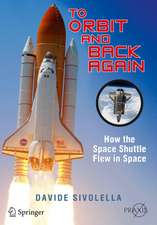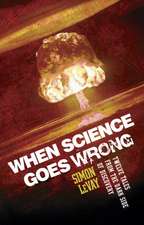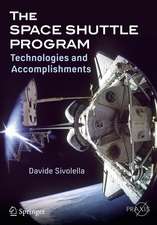Space Mining and Manufacturing: Off-World Resources and Revolutionary Engineering Techniques: Springer Praxis Books
Autor Davide Sivolellaen Limba Engleză Paperback – 18 dec 2019
This proposition for a space economy is not science fiction, but well within the remit of current or under development technologies. Numerous technologies are described and put together to form a coherent and feasible road map that, if implemented, could lead humankind towards a brighter future.
Din seria Springer Praxis Books
-
 Preț: 294.46 lei
Preț: 294.46 lei -
 Preț: 223.45 lei
Preț: 223.45 lei -
 Preț: 193.12 lei
Preț: 193.12 lei -
 Preț: 167.85 lei
Preț: 167.85 lei -
 Preț: 288.98 lei
Preț: 288.98 lei -
 Preț: 323.74 lei
Preț: 323.74 lei -
 Preț: 401.38 lei
Preț: 401.38 lei -
 Preț: 264.12 lei
Preț: 264.12 lei - 8%
 Preț: 513.00 lei
Preț: 513.00 lei -
 Preț: 190.01 lei
Preț: 190.01 lei -
 Preț: 218.16 lei
Preț: 218.16 lei -
 Preț: 312.06 lei
Preț: 312.06 lei - 17%
 Preț: 414.04 lei
Preț: 414.04 lei -
 Preț: 216.41 lei
Preț: 216.41 lei -
 Preț: 262.27 lei
Preț: 262.27 lei -
 Preț: 264.35 lei
Preț: 264.35 lei -
 Preț: 167.63 lei
Preț: 167.63 lei -
 Preț: 284.81 lei
Preț: 284.81 lei -
 Preț: 259.08 lei
Preț: 259.08 lei -
 Preț: 305.47 lei
Preț: 305.47 lei -
 Preț: 244.14 lei
Preț: 244.14 lei -
 Preț: 227.85 lei
Preț: 227.85 lei -
 Preț: 285.25 lei
Preț: 285.25 lei -
 Preț: 295.56 lei
Preț: 295.56 lei -
 Preț: 357.17 lei
Preț: 357.17 lei -
 Preț: 275.79 lei
Preț: 275.79 lei -
 Preț: 257.08 lei
Preț: 257.08 lei -
 Preț: 349.71 lei
Preț: 349.71 lei -
 Preț: 272.45 lei
Preț: 272.45 lei -
 Preț: 270.27 lei
Preț: 270.27 lei - 8%
 Preț: 456.51 lei
Preț: 456.51 lei -
 Preț: 352.34 lei
Preț: 352.34 lei - 8%
 Preț: 394.80 lei
Preț: 394.80 lei -
 Preț: 320.65 lei
Preț: 320.65 lei -
 Preț: 325.29 lei
Preț: 325.29 lei -
 Preț: 253.11 lei
Preț: 253.11 lei -
 Preț: 192.86 lei
Preț: 192.86 lei -
 Preț: 313.40 lei
Preț: 313.40 lei -
 Preț: 150.51 lei
Preț: 150.51 lei -
 Preț: 233.34 lei
Preț: 233.34 lei -
 Preț: 286.78 lei
Preț: 286.78 lei -
 Preț: 212.01 lei
Preț: 212.01 lei -
 Preț: 366.83 lei
Preț: 366.83 lei -
 Preț: 299.99 lei
Preț: 299.99 lei -
 Preț: 232.27 lei
Preț: 232.27 lei -
 Preț: 284.58 lei
Preț: 284.58 lei -
 Preț: 212.45 lei
Preț: 212.45 lei -
 Preț: 159.81 lei
Preț: 159.81 lei -
 Preț: 349.48 lei
Preț: 349.48 lei - 20%
 Preț: 2061.61 lei
Preț: 2061.61 lei
Preț: 212.68 lei
Nou
Puncte Express: 319
Preț estimativ în valută:
40.70€ • 42.49$ • 33.68£
40.70€ • 42.49$ • 33.68£
Carte disponibilă
Livrare economică 14-28 martie
Livrare express 27 februarie-05 martie pentru 37.91 lei
Preluare comenzi: 021 569.72.76
Specificații
ISBN-13: 9783030308803
ISBN-10: 3030308804
Pagini: 207
Ilustrații: XI, 207 p. 99 illus., 37 illus. in color.
Dimensiuni: 168 x 240 x 22 mm
Greutate: 0.42 kg
Ediția:1st ed. 2019
Editura: Springer International Publishing
Colecția Springer
Seriile Springer Praxis Books, Space Exploration
Locul publicării:Cham, Switzerland
ISBN-10: 3030308804
Pagini: 207
Ilustrații: XI, 207 p. 99 illus., 37 illus. in color.
Dimensiuni: 168 x 240 x 22 mm
Greutate: 0.42 kg
Ediția:1st ed. 2019
Editura: Springer International Publishing
Colecția Springer
Seriile Springer Praxis Books, Space Exploration
Locul publicării:Cham, Switzerland
Cuprins
1. Space Exploration: What For?.- 2. Extraterrestrial Resources and Where to Find Them.- 3. Off-World Mining.- 4. Processing of Space Resources.- 5. The Art of Manufacturing in Space.- 6. Building Factories in Space.- 7. Making it Happen.- 8. For the Benefit of Humankind.- About the Author.- Index.
Notă biografică
Davide Sivolella is an aerospace engineer living and working in the UK as a specialist in the design of aircraft structural repairs of civil airliners. Currently, he is employed by British Airways at London Heathrow Airport. As a child, Davide has developed a fascination with all kinds of flying machines, especially those which travel above the atmosphere. In fact, this passion for astronautics led to a bachelor’s and master’s degrees in Aerospace Engineering from the Polytechnic of Turin (Italy). Being born in July 1981, just a few months after the Columbia’s maiden flight, he developed a fondness for the Space Shuttle program. Eventually, this has resulted in Springer-Praxis publishing in August 2013 his first book, To Orbit and Back Again: How the Space Shuttle Flew in Space. The book has been praised for its content on numerous outlets ever since. A sequel, entitled The Space Shuttle Program: Technologies and Accomplishments is currently scheduled for release at the beginning of July 2017.
Davide’s interest for space exploration is not limited to the Space Shuttle program. In recent years, he has researched how space exploration can foster a practical solution to help ease some of the most excruciating problems affecting Earth and humankind, such as environmental pollution, overcrowding, resource depletion, conflicts for scarce resource control, economic inequality, social unrest, economic instability, job displacement and unemployment. On a number of occasions, Jeff Bezos, Amazon and Blue Origin’s founder, has stated that he envisions a future where the manufacturing industry will be moved into space exploiting the resources of the Solar System. Davide’s research has convinced him that this vision is indeed feasible and capable of delivering a large amount of benefits that current plans for exploration of Mars or the Moon cannot match.
Davide’s interest for space exploration is not limited to the Space Shuttle program. In recent years, he has researched how space exploration can foster a practical solution to help ease some of the most excruciating problems affecting Earth and humankind, such as environmental pollution, overcrowding, resource depletion, conflicts for scarce resource control, economic inequality, social unrest, economic instability, job displacement and unemployment. On a number of occasions, Jeff Bezos, Amazon and Blue Origin’s founder, has stated that he envisions a future where the manufacturing industry will be moved into space exploiting the resources of the Solar System. Davide’s research has convinced him that this vision is indeed feasible and capable of delivering a large amount of benefits that current plans for exploration of Mars or the Moon cannot match.
Textul de pe ultima copertă
This book produces convincing evidence that exploiting the potential of space could help solve many environmental and social issues affecting our planet, such as pollution, overcrowding, resource depletion and conflicts, economic inequality, social unrest, economic instability and unemployment. It also touches on the legal problems that will be encountered with the implementation of the new technologies and new laws that will need to be enacted and new organizations that will need to be formed to deal with these changes.
This proposition for a space economy is not science fiction, but well within the remit of current or under development technologies. Numerous technologies are described and put together to form a coherent and feasible road map that, if implemented, could lead humankind towards a brighter future.
This proposition for a space economy is not science fiction, but well within the remit of current or under development technologies. Numerous technologies are described and put together to form a coherent and feasible road map that, if implemented, could lead humankind towards a brighter future.
Caracteristici
Written at an accessible level for the lay reader Offers a feasible strategy for a self-sustaining, space-based infrastructure for the exploitation of space resources Provides a road map of technologies that can be used to establish such a large-scale space economy

















